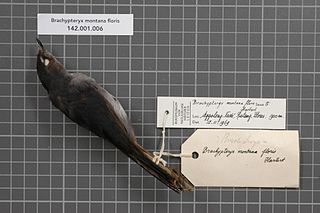The shortwings are colourful medium-sized mostly insectivorous birds in the genus Brachypteryx of the thrush family Turdidae, although some taxonomists place them in the Old World Flycatcher family Muscicapidae. They show strong sexual plumage dimorphism. All are southeast Asian species.

The Indian blue robin is a small bird found in the Indian Subcontinent. Formerly considered a thrush, it is now considered one of the Old World flycatchers in the family Muscicapidae. It was earlier also called the Indian blue chat. It is migratory, breeding in the forests along the Himalayas of Nepal, India, Myanmar and Bangladesh. They winter in the hill forests of the Western Ghats of India and in Sri Lanka.

Brachypteryx is a genus of passerine birds in the family Muscicapidae containing ten species known as shortwings, that occurs in southeast Asia.

The large hawk-cuckoo is a species of cuckoo in the family Cuculidae. It has a wide breeding distribution from temperate Asia along the Himalayas extending to East Asia. Many populations winter further south. They are known for their loud and repetitive calls which are similar to that of the common hawk-cuckoo but do not rise in crescendo. They are also somewhat larger and adults can be readily told apart from the smaller common hawk-cuckoo by the black patch on the chin. They are brood-parasites of babblers and laughing-thrushes.
The rusty-bellied shortwing is a species of bird in the family Muscicapidae. It is found in Yunnan, Northeast India and far northern Myanmar.

The Nilgiri blue robin, also known as Nilgiri shortwing, white-bellied shortwing, Nilgiri sholakili or rufous-bellied shortwing is a species of passerine bird in the family Muscicapidae endemic to the Shola forests of the higher hills of southern India, mainly north of the Palghat Gap. This small bird is found on the forest floor and undergrowth of dense forest patches sheltered in the valleys of montane grassland, a restricted and threatened habitat.
The Javan shortwing is a species of bird that is placed in the Old World flycatcher family Muscicapidae. It is endemic to the island of Java where it favours montane forests.

Gould's shortwing is a small species of passerine bird in the family Muscicapidae. It is found in the Himalayas, Yunnan and northern parts of Myanmar and Vietnam. It breeds in the eastern Himalayas in rocky areas above the tree-line and winters at lower altitude in wooded valleys.

The Javanese shrew is a species of mammal in the family Soricidae. It is native to Indonesia and East Timor. It ranges throughout Java and the Lesser Sunda Islands. It has also been introduced to Ambon Island and the Aru Islands.

The lesser rock shrew is a species of mammal in the family Soricidae. It is found in Azerbaijan, Kazakhstan, Tajikistan, and Turkey.

The white-bellied blue robin or white-bellied sholakili, is a bird of the family Muscicapidae. It is endemic to the Shola forests of the higher hills of southern India. The Nilgiri blue robin and this species were once considered separate species, later lumped as sub-species of a single species (major) and elevated again to full species in 2005 by Pamela C. Rasmussen. The species was earlier thought to be related to the shortwings and placed in the genus Brachypteryx and later moved to Myiomela since species in the genus Brachypteryx shows marked sexual dimorphism. In 2017, a study found that this is a sister group of the flycatchers in the genera Niltava, Cyornis and Eumyias among others. It was then placed in newly erected genus Sholicola. This small bird is found on the forest floor and undergrowth of dense forest patches sheltered in the valleys of montane grassland, a restricted and threatened habitat.

The lesser Ryukyu shrew, or Watase's shrew is a common species of shrews that is endemic to Japan. It is often found living in bushes and grasslands along the river banks and in shrubs of lower elevations.
Artibeus schwartzi, or Schwartz's fruit-eating bat, is a species of bat found in the Lesser Antilles. It was previously considered a subspecies of the Jamaican fruit bat,. It has been hypothesized that it arose from hybridization of three Artibeus species: A. jamaicensis, A. planirostris, and an unknown third species.

The Himalayan shortwing is a species of chat. This species is now classified in the family Muscicapidae.
The Chinese shortwing is a species of chat. This species is now classified in the family Muscicapidae.
The Taiwan shortwing is a species of chat. This species is now classified in the family Muscicapidae.

The Philippine shortwing is a species of bird in the family Muscicapidae. It is endemic to the Philippines where it favours montane forest.

The Bornean shortwing is a species of bird in the Old World flycatcher family Muscicapidae. It is endemic to Borneo where it favours montane forest.

The Sumatran shortwing is a species of bird in the Old World flycatcher family Muscicapidae. It is endemic to the island of Sumatra in western Indonesia where it favours montane forest.

The Flores shortwing is a species of bird in the Old World flycatcher family Muscicapidae. It is endemic to the island of Flores in the Lesser Sunda Islands where it favours montane forest.
















